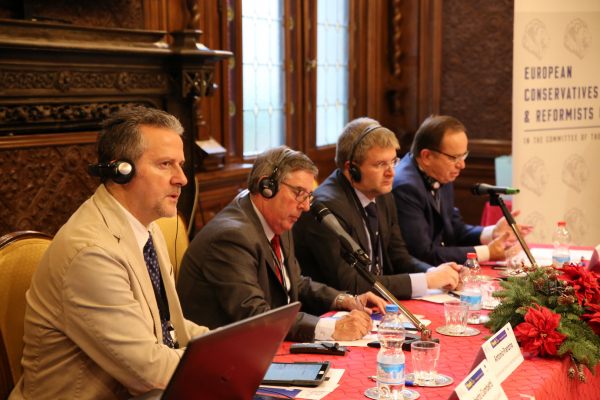Venice hosts first ever ECR CoR Study Days

The first-ever ECR CoR Study Days brought together local and regional leaders from nine EU Member States, as well as other leading thinkers from academia, government and EU institutions. The focus rested on the principle of subsidiarity and protection of cultural heritage. Both debates held in Venice were very timely. Firstly, the conference was organised at a time when the Italian city suffered worst series of high tides since 1872, with an estimated cost of 1 billion Euros. Secondly, it was organised one week before the 9th international Subsidiarity Conference due to be held in the Italian Senate.
The Study Days in Venice were organised on 15 November at the invitation of ECR member and the president of the Veneto Regional Council Roberto Ciambetti.
"We were inspired to organise these Study Days by our Group in the European Parliament, which hosts a similar event, but our ECR CoR Study Days have a more local focus," said ECR President Rob Jonkman, who welcomed the participants and thanked the hosting Member for holding the meeting despite the disastrous floods that hit the city. He underlined that he was "moved by the scale of the crisis" and that it was important that ECR Members show solidarity with the city by visiting it during the floods.
"The 'Venetian' ECR Study Days focus on two topics, which are close to the heart of every conservative: subsidiarity and the protection of cultural heritage. Distinguished speakers from the political, social and cultural worlds are participating in the two sessions and I thank all of you who came to Venice during that difficult time," said the hosting ECR Member Roberto Ciambetti.
In the first panel, politicians and experts discussed how the balance of competences enshrined in the EU treaties can be better preserved and the main challenges that local and regional authorities in Europe are facing with implementation of EU law.
Among the speakers were Senator Erika Stefani, former Italian Minister of Regional Affairs, Member of the Italian Parliament Matteo Bianchi, and Fenna Pols, Director of knowledge centre Europa Decentraal.
Panellists emphasised that many EU rules are overlapping and that local and regional authorities in Europe are afraid of asking questions to central governments and the European Commission, especially concerning state aid, as they feel that this may give the impression that they do something wrong.
Senator Erika Stefani spoke about problems with transposing EU law into Italian law. She underlined that updating laws written in archaic XIX-century language with modern EU wording poses many difficulties to the Italian judges.
Fenna Pols highlighted that the knowledge centre she is leading in the Netherlands, Europa Decentraal, received more than 20,000 questions from local and regional authorities last year on the implementation of EU law. She recommended that other countries look into setting up the similar institution, as currently, the Netherlands is the only EU Member State having such a knowledge centre.
The second panel focused on protecting European culture and identity.
"I am an Italian and I am in love with my country. The love of Italy obliges me to defend the traditions and cultural heritage of the people", said ECR MEP Carlo Fidanza, who underlined the need for the EU to better respect the sovereignty of its national governments and focus more on protecting the European way of life.
ECR Member Władysław Ortyl, Marshal of the Podkarpackie region in Poland, underlined that "cultural heritage is what helps to bring our cities, regions and countries together, both socially and economically" and presented some of the best practices from his region in Poland, including projects co-financed from the EU.
The conference was held at Palazzo Ferro Fini. This is the headquarters of Veneto Regional Council, of which our Member Roberto Ciambetti is the President. Palazzo Ferro Fini is considered to be 'the home of the Venetians,' the place where the highest form of democratic representation in the region is celebrated.

